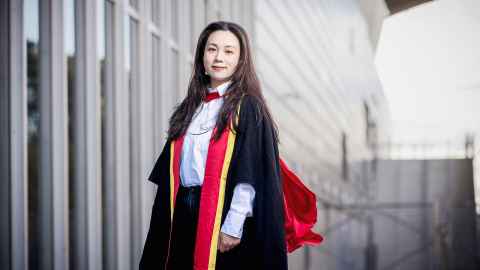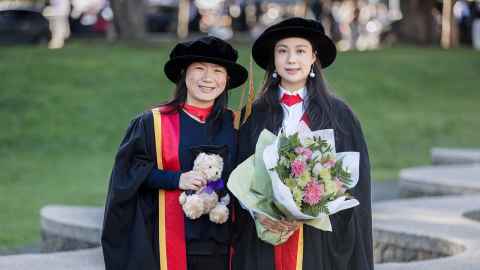From long-distance hurdles to doctoral success
8 May 2024
Xichen Chen's unexpected choice to pursue a PhD came amid personal challenges that have helped to shape her engineering career.

Xichen Chen had never envisioned pursuing a PhD until the challenges of a long-distance relationship became the catalyst for her unexpected path towards doctoral studies.
For nearly three years, Xichen and her husband Dr Yu Wang navigated the obstacles of maintaining their connection across borders. She had stayed in Beijing to take a job after completing her masters degree in structural engineering, while Yu had moved to New Zealand to pursue his PhD in geotechnical engineering at the University of Auckland.
“It wasn't easy for us to live apart for so long. So, after about nine months of working, I finally made the decision to leave my job and began preparing to apply for my own PhD,” she says.
Little did she know, the decision would not only unite their paths, but it would mark the beginning of a journey in the Faculty of Engineering that has shaped her academic career.
Four and a half years after moving to New Zealand, Xichen graduated with her PhD in Engineering on 7 May. The focus of her thesis, which earned a place on the Dean’s List for outstanding research, is on the adoption and implementation of digital technology in the architecture, engineering and construction (AEC) sector.
She has also authored and led six Q1 (top-quartile and best quality) journal articles resulting from her PhD research, with two more currently being prepared for submission – a notable achievement given she received multiple rejections for her first journal paper and faced significant disruptions to her research and data collection due to the Covid-19 lockdowns.
She says that while the future of designing, constructing, and maintaining buildings and infrastructure is bound to digitalise, research into how digital technologies are adopted and practically deployed remains limited. Similarly, the societal impact of digital transformation, especially on the current and future workforce, is not fully understood.
“This represents a fundamental and practical problem that practitioners and academia face in civil and construction engineering, not only in New Zealand but also in many other countries.
“Enduring global challenges, such as rapid urbanisation, population growth, the need for climate change adaptation and aging workforces worldwide have further highlighted the necessity for the AEC sector to transition towards a less labour-intensive, yet more productive, innovative and sustainable industry.”

After submitting her thesis last year, Xichen briefly transitioned into the industry as a technology consultant. However, she soon realised her passion lay in research and is currently pursuing academic positions in New Zealand and overseas with the goal of becoming a lecturer or assistant professor.
“My future research aims to investigate the application of artificial intelligence (AI) in construction decisions and explore how AI and other emerging digital technologies can be integrated to enhance efficiency and sustainability in the built environment.”
Xichen’s family has a strong background in engineering. Her parents, sister and sister’s husband all work in the field, which led her to pursue engineering when choosing what to study.
“My choice of civil engineering was largely influenced by my elder sister, who has been my closest friend and role model since childhood. Witnessing her successfully complete her bachelors and masters degrees in civil structural engineering inspired me to follow a similar path.”
She also credits her doctoral supervisors, Associate Professor Alice Yan Chang-Richards from the Faculty of Engineering and Professor Florence Yean Yng Ling from the National University of Singapore, for their guidance.
“They were steadfast supporters of my research journey and served as the closest role models, demonstrating the standards of excellence expected of a capable researcher.”
She was a recipient of the China Scholarship Council (CSC) and University of Auckland Joint Doctoral Scholarship, and served as the president of the Auckland CSC Students and Scholars Association.
The global impact of her research in engineering and technology innovation management was also recognised when she was invited as a guest author to collaborate on opinion pieces with researchers from the University of Cambridge, University College London and the University of Toronto.
“I hadn’t initially planned to pursue a PhD and doubted my ability to see it through. But this journey has taught me not to fear the unknown until I’ve given it a chance, and I’ve discovered that I'm capable of far more than I once thought. Sometimes a bit more patience, persistence and another attempt are all it takes.”
Media contact
Hussein Moses | Media adviser
M: 027 361 1000
E: hussein.moses@auckland.ac.nz